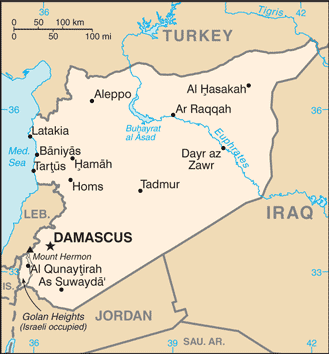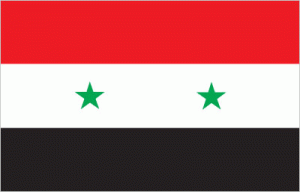 Aglow Status: Restricted
Aglow Status: Restricted
(The term “Restricted Nation” as used in Aglow is a nation where it is difficult or dangerous to be a Christian. Therefore the status of Aglow in nations indicated as Restricted is withheld.)
Capital: Damascus
Pray:
- Christians and Kurds need our prayers for their protection, and for God to lead them to safety.
- Pray for God’s divine wisdom, counsel, and unity for the Israeli government and the IDF.
- Pray that angelic hosts from God will shield the borders of Israel and the Israeli Defense
Forces from all evil coming into the nation, and for the safety of all their citizens. - Pray for Syria, that God Almighty will direct the course of this nation and bring it into divine
order, protecting the innocent, and revealing Jesus Christ as Lord in their midst!
Proclaim:
- Arise, shine; for your light has come! And the glory of the LORD is risen upon you. For behold, the darkness shall cover the earth, and deep darkness the people; but the LORD will arise over you, and His glory will be seen upon you. Isaiah 60:1,2 (NKJV)
- Lift up your heads, O you gates! Lift up, you everlasting doors! And the King of glory shall come in. Who is this King of glory? The Lord of hosts, He is the King of glory. Selah Psalm 24:9-10 (NKJV)
Interesting Facts About Syria
 Background: Following World War I, France acquired a mandate over the northern portion of the former Ottoman Empire province of Syria. The French administered the area as Syria until granting it independence in 1946. The new country lacked political stability and experienced a series of military coups. Syria united with Egypt in February 1958 to form the United Arab Republic. In September 1961, the two entities separated, and the Syrian Arab Republic was reestablished. In the 1967 Arab-Israeli War, Syria lost the Golan Heights region to Israel. During the 1990s, Syria and Israel held occasional, albeit unsuccessful, peace talks over its return. In November 1970, Hafiz al-ASAD, a member of the socialist Ba'ath Party and the minority Alawi sect, seized power in a bloodless coup and brought political stability to the country. Following the death of President Hafiz al-ASAD, his son, Bashar al-ASAD, was approved as president by popular referendum in July 2000. Syrian troops - stationed in Lebanon since 1976 in an ostensible peacekeeping role - were withdrawn in April 2005. During the July-August 2006 conflict between Israel and Hizballah, Syria placed its military forces on alert but did not intervene directly on behalf of its ally Hizballah. In May 2007, Bashar al-ASAD's second term as president was approved by popular referendum.
Background: Following World War I, France acquired a mandate over the northern portion of the former Ottoman Empire province of Syria. The French administered the area as Syria until granting it independence in 1946. The new country lacked political stability and experienced a series of military coups. Syria united with Egypt in February 1958 to form the United Arab Republic. In September 1961, the two entities separated, and the Syrian Arab Republic was reestablished. In the 1967 Arab-Israeli War, Syria lost the Golan Heights region to Israel. During the 1990s, Syria and Israel held occasional, albeit unsuccessful, peace talks over its return. In November 1970, Hafiz al-ASAD, a member of the socialist Ba'ath Party and the minority Alawi sect, seized power in a bloodless coup and brought political stability to the country. Following the death of President Hafiz al-ASAD, his son, Bashar al-ASAD, was approved as president by popular referendum in July 2000. Syrian troops - stationed in Lebanon since 1976 in an ostensible peacekeeping role - were withdrawn in April 2005. During the July-August 2006 conflict between Israel and Hizballah, Syria placed its military forces on alert but did not intervene directly on behalf of its ally Hizballah. In May 2007, Bashar al-ASAD's second term as president was approved by popular referendum.
Influenced by major uprisings that began elsewhere in the region, and compounded by additional social and economic factors, antigovernment protests broke out first in the southern province of Dar'a in March 2011 with protesters calling for the repeal of the restrictive Emergency Law allowing arrests without charge, the legalization of political parties, and the removal of corrupt local officials. Demonstrations and violent unrest spread across Syria with the size and intensity of protests fluctuating. The government responded to unrest with a mix of concessions - including the repeal of the Emergency Law, new laws permitting new political parties, and liberalizing local and national elections - and with military force and detentions. The government's efforts to quell unrest and armed opposition activity led to extended clashes and eventually civil war between government forces, their allies, and oppositionists.
International pressure on the ASAD regime intensified after late 2011, as the Arab League, the EU, Turkey, and the US expanded economic sanctions against the regime and those entities that support it. In December 2012, the Syrian National Coalition, was recognized by more than 130 countries as the sole legitimate representative of the Syrian people. In September 2015, Russia launched a military intervention on behalf of the ASAD regime, and domestic and foreign government-aligned forces recaptured swaths of territory from opposition forces, and eventually the country’s second largest city, Aleppo, in December 2016, shifting the conflict in the regime’s favor. The regime, with this foreign support, also recaptured opposition strongholds in the Damascus suburbs and the southern province of Dar’a in 2018. The government lacks territorial control over much of the northeastern part of the country, which is dominated by the predominantly Kurdish Syrian Democratic Forces (SDF). The SDF has expanded its territorial hold over much of the northeast since 2014 as it has captured territory from the Islamic State of Iraq and Syria. Since 2016, Turkey has also conducted three large-scale military operations into Syria, capturing territory along Syria's northern border in the provinces of Aleppo, Ar Raqqah, and Al Hasakah. Political negotiations between the government and opposition delegations at UN-sponsored Geneva conferences since 2014 have failed to produce a resolution of the conflict. Since early 2017, Iran, Russia, and Turkey have held separate political negotiations outside of UN auspices to attempt to reduce violence in Syria. According to an April 2016 UN estimate, the death toll among Syrian Government forces, opposition forces, and civilians was over 400,000, though other estimates placed the number well over 500,000. As of December 2019, approximately 6 million Syrians were internally displaced. Approximately 11.1 million people were in need of humanitarian assistance across the country, and an additional 5.7 million Syrians were registered refugees in Turkey, Jordan, Iraq, Egypt, and North Africa. The conflict in Syria remains one of the largest humanitarian crises worldwide.
Government Type: presidential republic; highly authoritarian regime
Population: 20,384,316 (July 2021 est.)
Ethnic Groups: Arab ~50%, Alawite ~15%, Kurd ~10%, Levantine ~10%, other ~15% (includes Druze, Ismaili, Imami, Nusairi, Assyrian, Turkoman, Armenian)
Languages: Arabic (official), Kurdish, Armenian, Aramaic, Circassian, French, English
Religions: Muslim 87% (official; includes Sunni 74% and Alawi, Ismaili, and Shia 13%), Christian 10% (includes Orthodox, Uniate, and Nestorian), Druze 3%, Jewish (few remaining in Damascus and Aleppo)
Interesting Facts information from the cia.gov website. Read more about Syria
